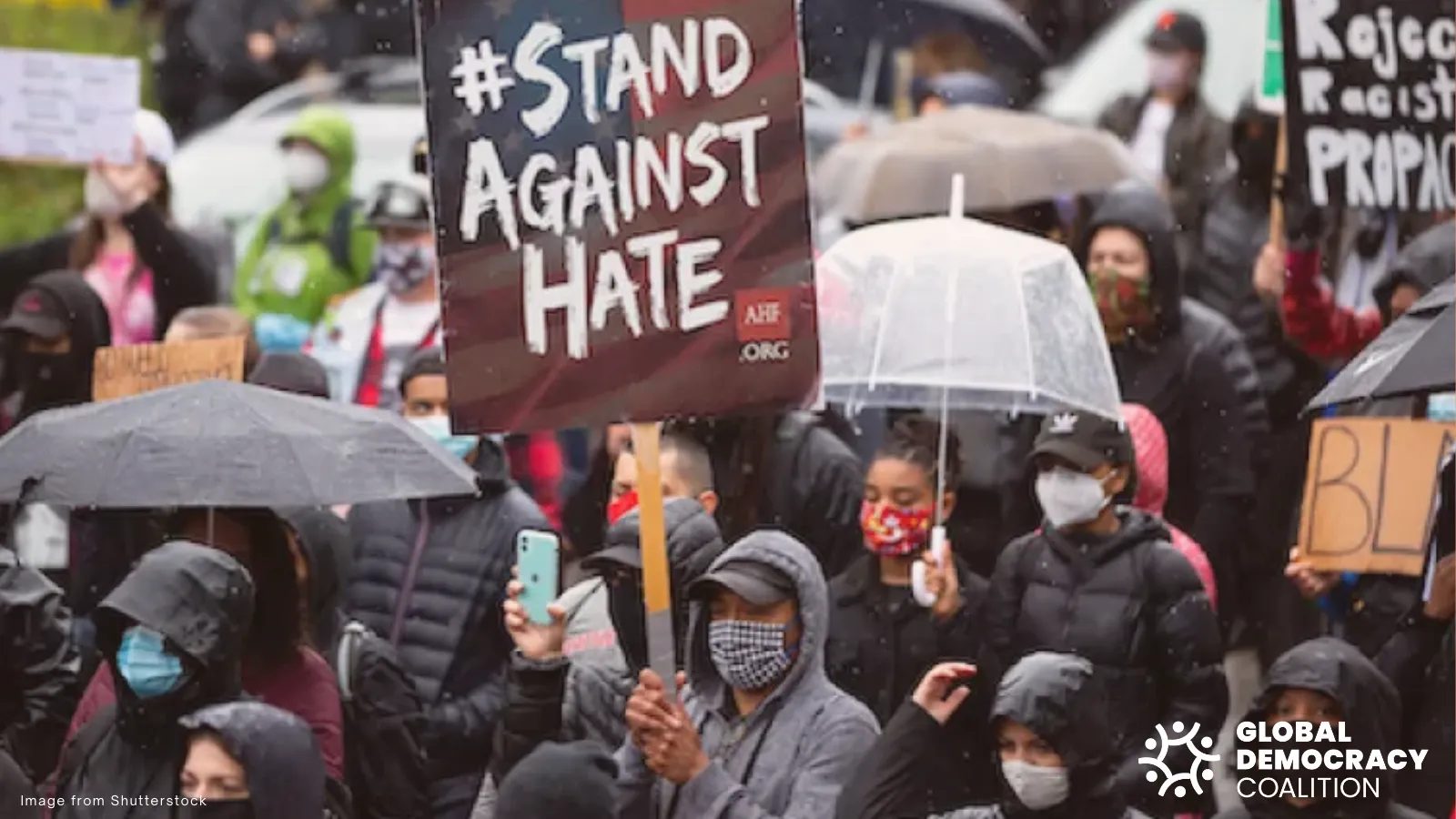When words become weapons: How hate speech threatens democracy

According to the EU Fundamental Rights Agency, reported hate crimes in Europe rose by nearly 20 percent in the past five years, reflecting a broader global trend documented by the UN Office of the High Commissioner for Human Rights. The proliferation of hate-filled rhetoric, particularly online, undermines the pillars of democracy, disrupts social cohesion, and silences the voices of vulnerable groups. Yet the effort to combat this trend is complicated by the necessity to protect freedom of expression. Balancing these two imperatives: upholding free speech while countering hate, has never been more urgent.
As United Nations Secretary-General António Guterres affirmed, “Addressing hate speech does not mean limiting or prohibiting freedom of speech. It means keeping hate speech from escalating into something more dangerous, particularly incitement to discrimination, hostility and violence, which is prohibited under international law” (United Nations, 2019).
A Dangerous Misconception: Hate Speech vs. Free Speech
At the heart of the debate is a persistent and dangerous misconception: that any effort to regulate hate speech automatically infringes on freedom of expression. This is often a false equivalency. Freedom of expression is a cornerstone of democratic societies, protected under international human rights law and enshrined in instruments such as the Universal Declaration of Human Rights (Article 19) and the International Covenant on Civil and Political Rights (ICCPR).
These rights enable individuals to seek, receive, and impart information and ideas. They form the foundation for other democratic freedoms, including peaceful assembly, participation in political affairs, and religious liberty. However, these freedoms are not absolute. Article 20 of the ICCPR, for instance, explicitly prohibits “any advocacy of national, racial or religious hatred that constitutes incitement to discrimination, hostility or violence.”
The UN’s Rabat Plan of Action offers guidance on distinguishing protected expression from unlawful incitement, emphasizing that restrictions must be carefully justified, proportionate, and necessary to prevent harm or ensure equality and inclusive participation.
From Words to Violence: Hate Crime as an Assault on Democracy
The link between hate speech and hate crime is not speculative, it is well-documented. Hate speech often lays the ideological groundwork for hate crimes by normalizing intolerance, dehumanizing specific groups, and encouraging the notion that violence is justified or inevitable. When hateful rhetoric is left unchallenged, it emboldens individuals and groups to act on these messages, translating words into direct physical harm. These crimes undermine core principles of equality, dignity, and justice that form the foundation of democratic societies. Hate crimes create fear, suppress participation in public life, and fracture the inclusive social fabric essential for democracy to thrive.
The Real-World Impact of Hate Speech
Hate speech is not merely offensive language. It is often the precursor to hate crimes, societal division, and even mass atrocities. In today’s digital era, inflammatory rhetoric can be disseminated globally in seconds, amplifying its reach and consequences. As history and contemporary cases show, language has been a powerful instrument to incite violence, mobilize extremism, and strip groups of their dignity and rights.
Consider the case of Belarus, where state-controlled media runs a weekly segment titled the “Order of Judas,” which singles out so-called “traitors” of the regime. This includes opposition leaders, journalists, artists, and former officials. By publicly targeting individuals, the state fosters a climate of fear, suppresses dissent, and normalizes exclusion and hostility within society.
Similarly, in the context of Russia’s war against Ukraine, dehumanizing language has been systematically deployed to label Ukrainians as “Nazis,” a rhetorical strategy that seeks to justify aggression and distort reality. Such narratives are not just propaganda, they are vehicles for incitement, manipulation, and erosion of democratic norms.
Digital Platforms: Accelerators and Battlegrounds
Online platforms have become the primary battleground in the fight against hate speech. While they offer unprecedented opportunities for free expression and global dialogue, they are also breeding grounds for radicalization and incitement. Recognizing this, the European Union has taken significant steps to address online hate.
In 2016, the EU launched a Code of Conduct on countering illegal hate speech online in partnership with tech companies such as Facebook, Twitter, and YouTube. The initiative has since expanded to include TikTok, LinkedIn, and others, establishing a multi-stakeholder taskforce to address online disinformation and hate speech.
The EU also supports broader strategies, including the EUvsDisinfo project, aimed at exposing and combating Russian disinformation campaigns. In 2021, the European Commission adopted a Communication proposing to add hate speech and hate crimes to the list of EU crimes, further emphasizing the urgency and gravity of the threat.
Combating Hate Without Silencing Dissent
To defend democracy, policymakers and societies need to remain vigilant not only about the rise of hate speech, but also about protecting legitimate expression and dissent. The solution is not blanket censorship or unchecked government intervention. Instead, we must employ a combination of legal, educational, and societal tools.
The UN encourages governments to favor “more speech” over suppression, promoting counter-narratives, investing in digital literacy, and fostering inclusive dialogue. Education plays a pivotal role in creating a culture of tolerance and critical thinking, equipping citizens to recognize and reject hatred in all its forms.
Meanwhile, international cooperation remains vital. Monitoring bodies such as the Council of Europe’s European Commission against Racism and Intolerance (ECRI) have consistently documented rising incidents of hate speech targeting minorities, migrants, and LGBTQ+ communities in member states. This data provides a critical foundation for evidence-based policy interventions.
Global Democracy Coalition Partners Leading the Way
While the threat of hate speech is daunting, many organizations within the Global Democracy Coalition are already pioneering approaches that both defend free expression and actively counter hateful narratives. Their work illustrates how civil society can respond with creativity, rigor, and solidarity.
In Malaysia, ARTICLE 19 has supported youth and marginalized communities through storytelling workshops and citizen media initiatives, empowering them to share overlooked perspectives and challenge hateful narratives at the grassroots level. Similarly, the Global Project Against Hate and Extremism (GPAHE) conducts groundbreaking research that exposes how extremist movements exploit digital platforms to spread bigotry and violence, ensuring that policymakers and the public alike have access to credible evidence of these threats.
The Digital Forensic Research Lab (DFRLab) of the Atlantic Council takes a complementary approach, equipping journalists and civic actors with the skills to investigate and report on extremism and hate online. By building capacity in investigative techniques, DFRLab strengthens the resilience of democracies against coordinated digital hate campaigns. And at the same time, PEN America has developed online harassment field manuals that offers practical guidance to writers, journalists, and activists facing hate speech and targeted abuse, combining legal, technical, and psychological strategies for resistance and recovery.
Together, these efforts underscore that countering hate speech is not about silencing dissent, but about amplifying diverse voices, safeguarding vulnerable groups, and reinforcing the democratic commitment to dignity and equality. They demonstrate that the global democracy community already possesses both the tools and the determination to meet this challenge head-on.
Defending Democracy from Within
Hate speech undermines the foundations of democracy. It erodes pluralism, suppresses participation, and drives wedges between communities. When left unchecked, it can incite violence, legitimize authoritarianism, and dismantle the norms that sustain democratic life.
Yet the answer is not to weaken our commitment to freedom of expression, but to reaffirm and clarify its boundaries. As UN Secretary-General Guterres reminds us, regulating hate speech is not about silencing ideas, it is about preventing harm and preserving the space where all voices, especially those at risk of exclusion, can be heard. The path forward lies in nurturing both free expression and human dignity, so that democracy remains a space for all voices.
Disclaimer: Opinions expressed in this commentary are those of the authors and do not necessarily represent the institutional position of International IDEA, its Board of Advisers or its Council of Member States.




